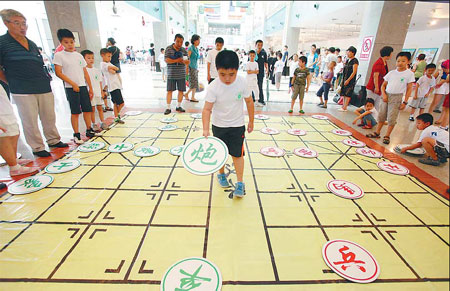IN BRIEF (Page 2)

| A boy plays Chinese chess on a giant chessboard in a summer camp in Tianjin on July 9, the first day of this year's summer vacation for primary and middle school students in the city. Liu Dongyue / Xinhua |
Health
Rabies on rise as pet numbers soar
As China becomes home to more and more pets and stray dogs, it is finding it ever more difficult to prevent and control the spread of rabies, officials said.
In Beijing, the risk that dogs are carrying the disease has increased as a result of the city's failure to ensure that all of them are vaccinated, said Wei Haitao, an official with the Beijing Municipal Bureau of Agriculture.
About a million dogs are now registered in the city and have received annual vaccinations meant to prevent and control epidemics, the Beijing Municipal Public Security Bureau said. Meanwhile, it is estimated that hundreds of thousands of dogs are not on the city's registration system.
In 2010 nine cases of rabies virus in humans were reported in Beijing. It was the worst year for the disease in the city since 1990.
Labor
Job satisfaction in short supply
Chinese workers are among the least likely in Asia to say their jobs are ideal, despite China having one of the region's lowest unemployment rates, a report by an international research company has found.
A survey conducted by management consultancy Gallup Inc in 2011, the results of which were released last week, found only 49 percent of Chinese workers think their job is the "ideal" one for them.
Compared with Chinese workers, only Vietnamese workers are less satisfied with their work, with a mere 48 percent saying they have the ideal job, putting them in the last place for job satisfaction on a list of 22 Asian economies.
The survey found job expectation in China remains high, despite figures from the National Bureau of Statistics showing the unemployment rate in China's urban areas in 2011 at 4.1 percent.
Wave of demand for seamen
Colleges are struggling to produce enough merchant seamen to meet demand, even though more graduates with non-maritime degrees are opting for a life at sea, experts have warned.
More than 10,000 graduates who studied non-maritime majors have joined the merchant fleet since 2006, thanks to training offered as part of a government program to support the shipping industry.
However, according to Li Enhong, director of merchant seamen management at the Ministry of Transport, colleges are able to produce only a few thousand merchant sailors every year, far short of what is needed.
China's trade has been developing rapidly since entry into the World Trade Organization, and this requires an increasing number of merchant seamen.
Beverages
Alcohol drinks sales hit a high
Thanks to rising demand and rising disposable incomes, China's consumption of alcoholic drinks is expected to reach 84.37 billion liters in 2016. That represents an average annual compound growth rate of 5.9 percent from 2012, said Frost & Sullivan, a US-based market consultancy.
Consumption of five major alcoholic drinks, including beer, white wine, rice wine, red wine and imported spirits, surged to 62.72 billion liters last year, compared with 46.52 billion liters in 2007, according to the consultancy. Red wine is now the most popular alcoholic beverage, with a penetration rate of 39 percent, far ahead of that of both white and fortified wines (2 percent). Red wine is closely followed by Chinese liquors (36 percent) and whisky (29 percent), according to a recent report by Ipsos, the Paris-based global market research company.
Transport
Another city to limit car plates
Guangzhou, capital city Guangdong province, has decided to limit car registrations starting this month, plans to introduce public auctions and a lottery to grant new car license plates in the following months.
Xian Weixiong, director of the Guangzhou commission of transport, said that a lottery embodies the principle of fairness, while public auctions can help those who really want to buy their cars get the license plates.
Funds raised from auctioning license plates will only be used to develop the city's public transport system. Guangzhou will grant no more than 10,000 new car license plates a month starting in July.
See comment, page 9
Society
Seniors need more support
Seniors in China, especially those living in rural areas, require more financial support and nursing services from the government given shrinking family sizes, according to a survey released on July 10.
The survey, conducted by the China Research Center on Aging, said those over 60 years old had 3.2 children on average in 2010, down from four in 2000.
The survey of about 20,000 respondents aged over 60 nationwide in 2010 also showed that nearly half of the seniors live in "empty-nest" families with children far away. In terms of financial wellbeing, the poll showed that the income gap between urban and rural areas remains large for seniors.
China Daily
(China Daily 07/13/2012 page2)
Today's Top News
- Xi calls for promoting volunteer spirit to serve national rejuvenation
- Xi chairs CPC meeting to review report on central discipline inspection
- Reunification will only make Taiwan better
- Outline of Xi's thought on strengthening military published
- Targeted action plan to unleash consumption momentum
- Separatist plans of Lai slammed































